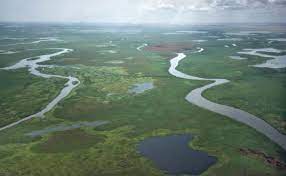Elders, intellectuals petition Kiir over Jonglei Canal project
April 19, 2022 (JUBA) – South Sudanese intellectuals and the Jieng (Dinka) Council of Elders have petitioned President Salva Kiir over the resumption in digging of the Jonglei Canal and dredging of the Nile River tributaries.
In an interview with Sudan Tribune on Monday, the Council’s Secretary General Joshua Dau Diu said they twice met government officials and expressed concerns on how digging of the canal and combing of the Nile tributaries would drain water from low wetlands and tributaries into the Nile.
The Jonglei Canal was a canal project started, but never completed, to divert water from the vast Sudd wetlands of South Sudan to deliver more water downstream to Sudan and Egypt for agriculture and industrial use.
“The council has rejected the resumption of this project from the time we heard what the vice president for infrastructure development and the minister of water resources said in the media. We did not mince our words and position because they are advancing the views of Egypt,” said Dau.
The veteran politician, one of those arrested in opposing the construction of the canal in 1974, said the matters concerning the project are “not new.”
“It was the Egypt-Sudan project of digging the Jonglei Canal that was initially proposed in 1904 to be dug in the heart of South Sudan to drain water from tributaries and the canal because these two countries are in dire need of water, and it led them to construct Aswan dam for Egypt and Jebel Awlia dam in Sudan”, said Dau.
He continued: “The proposed canal with its multiple imaginary and fallacious developmental projects were drastically objected to by South Sudanese public in a countrywide mass demonstrations and students protests during which a schoolboy was shot dead by police that fired live bullets in a failed attempt to disperse the protestors in Juba in 1974”.
Dau said several people, including members of Parliament, were detained.
“Those members of Parliament who were arrested and imprisoned included Hon. Clement Mboro, Stephen Ciec Lam, Benjamin Bol Akok, Simon Mori, Gabriel Acuoth Deng, and me, the one who is speaking to you. I am the one who is alive today and the rest, the majority passed away,” recalled.
Dau vowed to continue leading resistance to the Jonglei Canal project.
Juba University Vice-Chancellor, John Apuot Akech said over 200,000 people signed a petition calling for an end to any activities on the canal.
The campaign is part of a petition seeking Kiir’s support to halt the project.
“I welcome signatures by academics, civil society, concerned public, students, and people of goodwill everywhere”, Akech notes in the petition.
Also included in the petition is the issue of arms embargo since South Sudan does not currently trade with the United Kingdom and countries in the European Union (EU) as a result of sanctions imposed on individual leaders.
Akech said the restrictions amount to a trade embargo because they do not allow business-to-business transactions, causing the country get goods or services from companies in the EU countries and the United Kingdom.
For is part, former Defense minister, Majak De Agoot said the best way to handle flooding in the country was to regulate water levels when it is risen above normal, proposing building of dams on Fula Rapids and Biden Falls.
These dams, he argued, would provide both clean energies for consumption in the entire country and can also be used as grand reservoirs.
Aldo Ajou Deng Akuey, a former Sudanese deputy prime minister said rise in water levels should be prevented to save lives and peoples’ properties.
“Although Egypt is dredging rivers, tributaries, and streams, this project must be suspended till further studies are undertaken by nationals of South Sudan to determine benefits in areas of agriculture and hydropower,” said Akuey.
ABOUT THE JONGLEI CANAL PROJECT
The idea of the Jonglei Canal project was proposed by Sir William Garstin, a British civil engineer, in 1907. In 1946, the government of Egypt conducted a study and plans took shape between 1954 and 1959 during the period of decolonization which included Sudanese independence in 1956. Against the context of Sudan’s postcolonial civil conflict, the Sudan People’s Liberation Army (SPLA), led by late Dr. John Garang De Mabior halted construction of the canal in 1984. The dispute over the canal and access to Nile waters, added a significant environmental dimension to the post-1983, second Sudanese civil war, in which disputes over the religious, linguistic, and cultural elements of Sudanese national identity also played prominent roles.
(ST)

